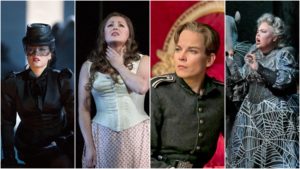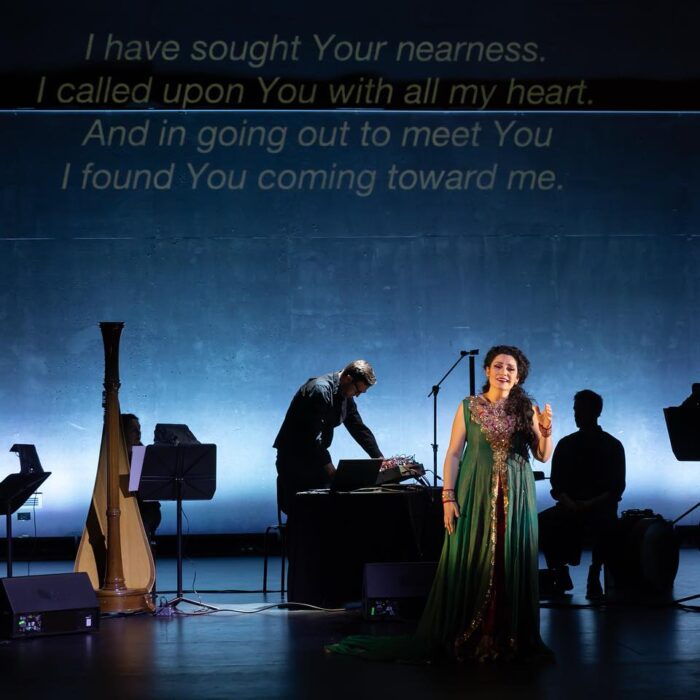
Best of Metropolitan Opera 2016-17 Season: Top 10 Female Performances of the Year
By David SalazarThis article is a joint collaboration between David & Francisco Salazar.
This past weekend saw the end of the Metropolitan Opera’s 2016-17 season. This week we will take a look back at the greatest moments that this season brought us, beginning with the top performers that we enjoyed.
Since ladies should always go first, we start with the top 10 female performances of the season. In these editions, David and Francisco will each showcase their five different choices for this category.
Enjoy!
Honorable Mentions: Limiting this list to just 10 performances was rather difficult, especially when you consider just how much talent performed on that stage throughout the year. So here are some of the women that we felt still need to be recognized and came ever so close to make it to our final list. They include Krassimira Stoyanova (“Aida”), Kristine Opolais (“Rusalka”), Pretty Yende (“Roméo et Juliette”), Jennifer Rowley (“Cyrano de Bergerac”), Isabel Leonard (“Don Giovanni”), Clémentine Margaine (“Carmen”), Ailyn Pérez (“La Bohème”), Elza van den Heever (“Idomeneo”), and Carmen Giannattasio (“La Traviata”).
And now onto our favorites (I must emphasize this word, as this all comes down to personal preference).
David’s Favorite 5
Elina Garanca (“Der Rosenkavalier”)
When she was Octavian the Latvian mezzo was completely unrecognizable. Her gait, her husky vocal colors and overall elegance made her the perfect portrait of the gentlemanly Octavian. And yet in scenes with Renée Fleming’s Marshallin, she could suddenly transform into an impetuous and insatiable teenager. Then, as Mariandl, she suddenly shocked audiences with a brilliant Marlene Dietrich impersonation, exuding sensuality and aggression. From start to finish, it was impossible not to be completely engrossed in Garanca’s characterization, both physical and vocal, of Octavian.
Liudmyla Monastyrska (“Nabucco”)
The Ukrainian soprano went head to head with Plácido Domingo, and for many moments in their big showdown, she had the upper hand. That’s how powerful Monastyrska’s Abigaile was. She was imposing both physically and with that gigantic voice, she possesses. This role is treacherous because it requires a soprano di forza and yet calls for a singer capable of dispatching coloratura like she’s a lyric soprano. Many sopranos struggle with the latter, but not Monastyrska who put together a cohesive vocal performance. But she also managed to unlock essential vulnerability in the character so she didn’t just turn into an ambitious monster. Her rapport with Domingo was top-notch, particularly in their big duet, probably the greatest onstage battle in the Met’s 2016-17 season.
Marina Rebeka (“Guillaume Tell”)
From her mysterious entrance during her meeting with Arnold until the grand finale, Rebeka was arguably the most electrifying artist in a tremendously well-rounded cast. I never quite forgot how she turned those coloratura runs in the act three aria “Pour notre amour, plus d’espérance” into vicious rebukes and then painful outcries. Or how a few scenes later she took over the entire stage as she fought back against Gesler, establishing her powerhouse presence in the moment of crisis. Or how her voice soared in that final chorus. It was a complete package and the only negative aspect of this performance is that it wasn’t featured as part of an HD transmission.
Nina Stemme (“Tristan und Isolde”)
The fury and anger that Stemme produced during that first act of “Tristan” were undeniably some of the most visceral emotions I experienced this season. To see her rip through text with such bitterness and fury was both thrilling and menacing. And then to feel the sublime tenderness in her singing during that most glorious of musical passages, the “Liebestod,” simply emphasized just how consummate an artist Stemme is and how she can take one of the most complex and difficult operatic roles and transform it with such seeming ease and elegance.
Amber Wagner (“Der Fliegende Holländer”)
I saw her on the final night of the this opera’s run and was simply stunned by the sheer power of her voice. When people complain that they don’t produce voluminous instruments anymore, I would probably advise them to go see Wagner. But sheer mass of sound isn’t enough to land her here. If you read my review, you know of my immense enthusiasm for Wagner’s multi-faceted interpretation of Senta’s ballad, a piece that by itself works if the singer just follows the composer’s indications. But Wagner managed to dig deeper, finding newer colors to author one of the musical highlights of the year.
Francisco’s Favorite 5
Jamie Barton (“Rusalka” and “Nabucco”)
Barton is one of the most diverse singers at the moment. While Fenena is not a huge role, Barton used all her moments to shine from the magnificent trio to her beautiful shining arioso at the end. There was so much nuance in this portrayal and it was a radical change from her Ježibaba, which as noted in Operawire’s review, was “Satan-lite.” There was a demonic feel to her portrayal yet she was able to create comic timing. And her singing had an aggressive edge to it, particularly at the end. While this character could have easily fallen to the trappings of being one note, she created the most dynamic character in the production.
Diana Damrau (“I Puritani”)
Yes, Damrau was sick during the entire run and she had some off notes during opening night and throughout the run. But let’s face it, that did not stop the virtuosic soprano from giving a very full-bodied interpretation and showing vocal fireworks throughout the entire performance. As a matter of fact, she defined the very problematic character of Elvira to perfection keeping the manic depressive real and grounded. This not only enhanced the chaotic plot but also created an understandable story. And that credit can only be given to a soprano who has studied her character to perfection and who has a full understanding of the musical style.
Nancy Fabiola Herrera (“Salome”)
Let’s face it. When you go see a performance of Salome, all eyes are on the lead singer. However, on this occasion, it was hard to take your eyes away from Fabiola Herrera, who was portraying Herodias. The moment the singer walked on stage, it was evident this character was a desperate woman trying to win over her husband. Her catty nature gave a very naturalistic portrait of her frustration and added a layer to her relationship with her daughter, shaping a rivalry that is often ignored. And then there was the voice which boomed over the immense orchestra that Strauss requires. It filled the Met auditorium and each time she had an outcry her singing created an impression on the listener.
Karita Mattila (“Jenufa”)
The return of Karita Mattila was almost impossible to ignore. Her Kostelnička was one of the most heart-wrenching experiences this season. Mattila walked on stage with an imposing figure wrapped into her maternal character looming over her daughter. Her voice started the evening with a lighter sound but it was the second act that really showed what this singer is still capable of doing. In her aria to Steva, she mourned for her daughter’s honor while in her monologue the desperation in her singing let out an incredible outburst that was one of torment and remorse. It was a tour de force and one of the performances that should have been seen Live in HD.
Anna Netrebko (“Eugene Onegin”)
Netrebko is not always known for her subtlety but her latest portrayal of Tatiana was an impeccable showcase of a mature artist at the top of her career. Netrebko was careful with each gesture that she gave Tatiana, bringing to life a shy young woman at the beginning and a regal woman at the end. Her singing was also filled with subtle dynamics going from internal pianissimos to fortes of outpouring emotions in both the final duet and the letter scene. In the end, Netrebko created one of the most complete portrayals this season.
Categories
Special Features

